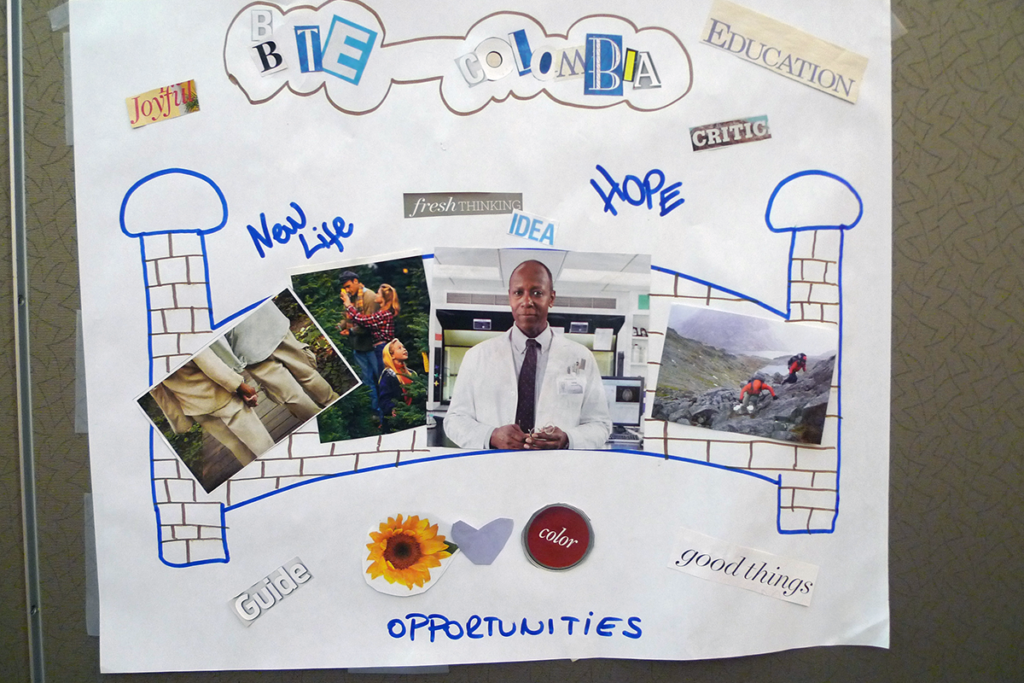Launched in 1992, the Bridge to Employment (BTE) college and career readiness program works with students in disadvantaged communities across the globe to increase their awareness and understanding of health careers and educational opportunities beyond high school/secondary school. Students participate in the program from 10th-grade through 12th-grade.
FHI 360’s National Institute for Work and Learning (NIWL) has managed BTE, a Johnson & Johnson program, since 2003. We are conducting an ongoing cross-site evaluation that shows positive outcomes in academic achievement, graduation rates and increased aspirations for higher education. This evaluation includes comparing participants’ science and math grades and annual survey responses to that of a comparison group, as well as gathering participant feedback through BTE focus groups. But how can we truly know if the program helps participants reach their college and career goals?
Methodology
Our primary research questions were:
- How has the BTE college and career readiness program influenced students’ educational goals and career attainment?
- What components of the BTE college and career readiness program do alumni describe as most beneficial?
We invited the 522 alumni in our database to complete an online survey to gather general opinions. A total of 54 alumni responded (a 10 percent response rate). Next, we conducted interviews with a smaller group of 23 alumni to dive more deeply into their perspectives and experiences. We selected these interviewees as part of a purposeful sample to ensure representation across countries and graduation years.
I analyzed the survey data with basic descriptive statistics using Excel and SPSS. The interviews were recorded, transcribed and then analyzed using NVivo software. I conducted a thematic content analysis to identify common themes and experiences, as well as notable distinctive comments. For the unit of analysis, I used a sentence or a paragraph – whichever was sufficient to capture a participant’s complete thought.
I reviewed each transcript related to the main themes: BTE’s influence on education decisions and career choices, and participants’ perspectives on BTE’s most beneficial components. Then, I coded emerging sub-themes and new themes, combining and reorganizing as needed. I grouped commonalities within each theme, and selected quotations to highlight these themes. I also noted individual comments to describe unique ideas.
Findings
The majority of BTE alumni confirmed that the program had a positive effect on their lives: 92 percent said the program influenced their education decisions and 82 percent said it influenced their career decisions. In terms of how the program influenced them, we identified the following four main themes.
Exposure to a variety of careers
One alumnus commented that he thought most employees within a science organization conducted research in a laboratory. He said BTE “opened the door to how many careers there were” and that he would not have realized the different options without BTE.
Being part of BTE boosted one alumna’s interest in STEM2D (Science, Technology, Engineering, Mathematics, Manufacturing, and Design) and innovation; once she took a physics course in high school, she realized that she wanted to become an engineer. Another alumnus was considering journalism or law, but he decided on social work after participating in BTE community service.
Having the opportunity to talk to professionals about their work and observe them in their roles was reported to be integral – job shadowing helped them see how different jobs play out. One alumna said:
“[Job shadowing] helped me make sure nursing was what I wanted. This was a big help for me – I didn’t go into college not knowing. It solidified what I wanted to do. I went from getting my feet wet to jumping in head first.”
Gaining and increasing soft skills that are key to education and careers
I heard from alumni that acquiring and strengthening a number of such soft skills – including team building, time management, organization, study skills, interpersonal skills and communications skills – significantly helped them in their education and career paths. They described obtaining these skills through classes/workshops, work experiences, group exercises and one-on-one sessions with BTE volunteers.
One-third of the alumni interviewed noted interpersonal communication as an important skill – learning how to speak to professionals, older peers and authority figures. One alumnus pointed out that this was “the type of knowledge I could not gain from ordinary school.” Another alumnus expressed gratitude to BTE for helping him overcome his fear of talking to authority figures – a “significant triumph” that enabled him to converse with university professors. Additionally, time management skills helped alumni while still in high school, during higher education and on into the working world.
Alumni described how other soft skills such as leadership, perseverance, discipline and public speaking led to their personal growth. These skills increased their confidence, built their self-esteem and enabled them to be more aware of their own strengths. One alumnus explained that BTE “just rounded me out as a person.”
Learning the steps to prepare for post-secondary education and careers
One alumnus described this as the “play-by-play of how to get where I wanted to get,” including specifically what grades were required, how to format essays, and suggestions for extra-curricular activities or internships to pursue. A first-generation college student said a BTE volunteer was “like an angel” to her; while her own family did not know how to provide guidance on applying for college or financial aid, the volunteer was “always someone I could go to with questions.”
Another alumnus spoke about how meaningful it was that BTE volunteers took the time to explain these steps on an individual basis with students, to check in on their grades and to provide them with encouragement along the way. After being encouraged to run for school office, he became vice president of his senior class and appreciated being “held to a higher caliber.” Another alumnus emphasized how critical it was for BTE to teach what she considered to be fundamental pieces, such as resume preparation, or how to best present yourself at an interview, because so many high school/secondary school students are not familiar with these key steps.
Importance of interpersonal relationships
The majority of BTE alumni identified BTE volunteers as a support in terms of their future career. Volunteers provided advice, served as mentors, helped introduce alumni to different career paths and offered connections to obtaining internships and jobs.
One alumnus stated, “We could always call and reach out, speak to one of the BTE volunteers who knows someone who knew someone.” Another alumna remarked that she felt lucky when she got her “dream job” six months after graduation because a BTE volunteer connected her to people she knew at a hospital. She emphasized, “Contacts are everything.”
Peers were also an important source of support to alumni. During interviews, alumni discussed the close “lifelong friendships” they formed. More than two-thirds of alumni surveyed reported staying in touch with fellow BTE graduates after graduating from the program. These relationships were strengthened by sharing the same experiences and the same outlook on the importance of education. One alumnus said:
“I used to be very introverted. I was shy, and ever since I was in this group, I have become more outgoing. I started to love myself more. I started to believe in myself, in my possibilities, and if I want to do something, I will be able to do it.”
Almost half of alumni remarked in the interviews that they experienced an increase in self-confidence from the interpersonal relationships, which subsequently helped in their education, job positions and life in general.
While our findings align with other studies of college and career readiness programs, such as ACT (2015) and America’s Promise Alliance (2017), our study is significant due to the deep perspectives BTE alumni with several years of real-world experience have. Therefore, the alumni study confirms the findings of the ongoing cross-site BTE evaluation and underscores their importance.
The alumni study findings have been shared with the Bridge to Employment director, staff and funders as well as with the current sites, and the information is now used to inform program planning across sites and at the local level.
Photo credit: FHI 360




